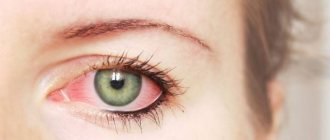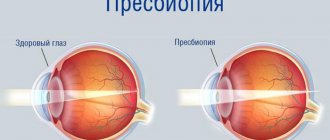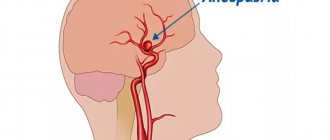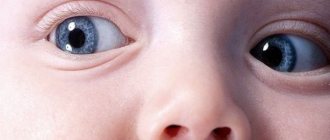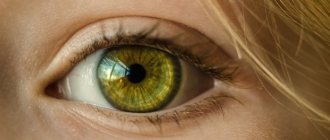A problem such as nervous tics occurs quite often in children. When this happens, parents begin to worry. They forbid older children from blinking their eyes too often, which doesn’t work out very well. Nervous tics in an infant, frequent blinking of the eyes, completely cause panic. How justified is it?
Nervous tic in a baby
What is a nervous tic
A tic is an obsessive movement that happens on its own. There are many types of such disorders: facial, vocal, and so on. In some cases, they can become pathological, but they often occur in healthy children.
In infants, tics occur less frequently than in older children. The highest prevalence is observed in boys and girls aged 4 to 6 years. At 10-11 months the symptom is rare. This is caused by the peculiarities of the development of the baby’s nervous system.
Important! By the age of 7-8 years, the formation of the subcortical parts of the brain ends, and the frequency of tics decreases sharply.
Diagnosis of nervous tics
A child's eyes swell after sleep - possible causes, symptoms
The presence of a nervous eye tic can be determined with the naked eye. If you need to establish the exact cause of the disease, you should consult a doctor. First, the parent goes to the pediatrician, then takes a referral for a consultation with a pediatric neurologist.
Sick baby
Depending on the baby’s age and his condition, additional consultation with a psychologist, psychotherapist or psychiatrist may be required. If the baby often blinks his eyes, examinations may be prescribed: EEG of the brain and biochemical blood test.
Main manifestations
The symptom is expressed in frequent blinking or twitching of the eyelid, and can spread to one or both eyes. Eyebrows may also twitch in a newborn baby or an older child. The baby can raise/lower the eyelid either alone or together with the other.
First aid for nervous tics
Let's look at this in more detail. What to do if a child's eye twitches? How to help your baby?
The following techniques can help relieve discomfort caused by twitching of the eye muscles:
- Switching attention.
- Use of compresses.
- Eliminate nervous twitching with exercise and massage.
To distract your baby from unpleasant symptoms, try to keep him busy with some activity, such as drawing or board games. Try to protect your child from watching TV and computer games. When a child is truly interested in the creative process, pathological impulses are suppressed. But as soon as the baby stops drawing or playing, the effect disappears.
As for massage, simple light pressure on the inner and outer corners of the eye will do. Strong squeezing of your eyes (for 3-5 seconds) can temporarily overcome twitching. Typically this exercise is done in three sets at one minute intervals.
Classification
Nervous cough in a child—symptoms, treatment
Tics are divided into primary and secondary. The latter are caused by some kind of disease. In turn, the primary ones manifest themselves.
Nervous disorders of young children
All ticks are divided into:
- Facial. The muscles responsible for movements of the nose and face twitch. The symptom may also affect the mouth. Tick can appear on one side or both. Eye tic in a child falls into this category.
- Vocal. The child makes involuntary sounds. This type is further divided into two. Vocal tics can be simple or complex. In the first case, the baby makes primitive sounds, while in the second, complex words and constructions. In some cases, it can reach the point of coprolalia - shouting obscene expressions. Very common in Tourette syndrome, a rare hereditary disease.
- Respiratory. Violations manifest themselves in obsessive coughing and loud breathing.
- Opercular. In this case, the chewing muscles are involved. For example, a person can click his tongue, teeth, slurp, and so on.
- Manual. The arm muscles are used. A person can rotate his hands, rub his palms, snap his fingers.
- Focal. Complex tics, including several at once. For example, the eye may twitch, the head and limbs may move simultaneously.
Nervous tic in a child: blinking eyes more often than normal, causes and treatment of pathology
If a child begins to involuntarily perform rhythmic eye movements, then this is a reason to pay additional attention to these movements. There is a possibility that he is developing a nervous tic. The condition is unpleasant, but very common. The first step is to identify the causes of the disease and how to treat it.
- Share
- Tweet
- Share
- Cool
- Send
general information
A tic is a spontaneous contraction of one muscle or an entire group. The contraction occurs following an erroneous command sent by the brain.
Children are more likely than adults to suffer from this disease. Moreover, it is important to note that this feature is more common among girls than among boys and belongs to a very wide age group (from 2 to 18 years), but especially critical moments of development are highlighted when their manifestation becomes more frequent - at 3 years and 7-8 years.
Their strength varies depending on the time of day, year, season and mood.
Tics rarely occur during gaming or when performing an exciting task that requires concentration. But as soon as you take your mind off an interesting task, the tics return.
Classification
Tics are divided into several categories:
- motor - these are those that are characterized by involuntary muscle contraction - blinking, flinching, etc.;
- vocal ones are manifested by the production of sounds - coughing, whistling;
- ritual - walking in a circle.
Why does a baby's eyelid twitch?
There is an opinion that only “nervous” children get tics. But this fact can be refuted by the fact that all children have a “nervous” age (when the struggle for independence occurs - at 3 years and 6-7 years), but despite the nervousness, the disease does not manifest itself in all.
A tic associated with blinking sometimes has a simple explanation for the nature of its origin:
- Overwork is one of the most common causes. Factors that affect the appearance of overwork are lack of sleep or poor sleep quality. As a result, the muscles do not receive the required rest and are constantly tense.
- Excessive strain on the eyes. Today, children are put in front of the computer or cartoons for long periods of time, while their visual organs are not ready for such stress.
- Dry eye syndrome, which can only be determined by an ophthalmologist after a complete diagnosis.
Neurological causes
There are several types of neurological causes:
- Primary , i.e. associated with changes in the central nervous system. Children with attention deficit hyperactivity disorder (ADHD) are more likely to have tics. The emotional and psychological turmoil associated with feelings of loneliness or insecurity cannot be ignored. Often, excessive demands from parents or even their lack of attention influence the onset of the disease.
- Secondary. This type of tic is a symptom of some more serious disease. It can become an indicator of a much more serious disorder in the functioning of the body:
- traumatic brain injury;
- infectious disease;
- Neoplasms in the brain;
- mental disorder, etc.
The list can go on for a very long time. Only an experienced specialist will reveal the true cause of the tic.
Hereditary
Passed on from generation to generation. The most common cause is Tourette's syndrome.
: Will homeopathy help cure conjunctivitis?
Causes of eye tics
Why does a child scratch his eyes and nose with his hands, possible reasons
Nervous eye tics in a child can occur for the following reasons:
- Biological. In this case, the symptom is provoked by infectious and viral diseases. For example, a common reason why a child's eye twitches is a streptococcal infection. If the immune system fails, the pathogen can infect the nervous system. Hereditary factors play an important role in the development of tics. If parents have had tics before, there is a high probability that their child may also develop them. In some cases, the eyes may begin to twitch due to ARVI.
- Psychological. It is unlikely that a baby's eye twitches for this reason. Since the condition in the overwhelming majority of cases occurs in older children, this category of causes is the most likely. A child twitches his eyes after conflicts with peers, due to a lack of love from his parents, severe fear or mental stress. Therefore, when the baby is still a baby in age, parents should already pay enough attention to him. This is the key to his health and successful development in the future.
Nervous tic of the eye in a child: causes and treatment of pathology
Repetitive movements that occur suddenly and uncontrollably, involving the facial muscles and eyes, are all mechanisms of neurological impairment.
Nervous eye tic in a child , the causes and treatment of which require medical justification and control, causes significant discomfort to both the baby and his parents. However, you should not worry about the severity of the disease: a deviation noticed in time can be quickly eliminated. In most cases, you won't even need medication.
Experts have actually found that 30% of children develop this pathology in one way or another. In boys it is more severe and appears more often than in girls. Typically, a nervous eye tic in a child develops during a period when the stress on the psyche and emotional sphere increases (school, passing exams, entering university).
Causes of appearance on the eye
A nervous tic in a child manifests itself in the eyes, which is associated with the high density of muscles in this area. The appearance of pathology also contributes to:
- a huge concentration of small nerve endings on the face;
- the weakest muscle zone is located in the eye socket;
- The face is directly related to all human emotions.
Constant tics in the eyes cause discomfort to the child and require treatment.
Causes of neurological disorder
Doctors classify the causes of nervous eye tics in a child according to the factors of their occurrence. So, there are primary and secondary tics. Primary disorders include disorders of the nervous system that are not associated with diseases of the internal organs.
Primary tics develop in children between the ages of 7 and 12, during the period of the first significant emotional and psychological stress. During this period, the child’s nervous system and motor skills are especially vulnerable; they undergo hormonal changes and the characteristics of adolescence.
Important! If a tic appears before the age of 5, this may indicate hidden diseases or serious abnormalities in the development of the nervous system.
Primary blinking, caused by tics of the facial muscles, is formed under the influence of psychogenic factors:
- psycho-emotional trauma and shock - the child suffers from fear and tension, which can often be caused by parents cursing among themselves or towards the child (too high demands, strict upbringing);
- The first of September tic is a special syndrome associated with the first visit to school, and develops in approximately 10% of children. All this is connected with the changing social reality, in most cases it can be easily corrected;
- nutritional problems – severe deviations in diet can provoke a neurological disorder. An abundance of fats, refined sweets, a lack of nutrients, magnesium and vitamins cause disturbances in muscle function and interfere with the transmission of nerve fibers;
- use of psychostimulants - children should not drink tea and coffee; even in small quantities, any energy drinks are dangerous. All of them overstimulate the nervous system and increase its wear and tear. If a child often drinks any of these drinks, he is guaranteed to have an eye tic;
- The cause of a nervous eye tic may also be overwork - the baby sleeps too little, or his sleep is too light, or some factors interfere with him. Overwork can be caused by playing games on a computer, smartphone or tablet. It also benefits from reading in poor lighting;
- heredity - nervous tics that have ever been observed in close relatives are passed on to children with a 50% risk. Then, for their prevention and treatment, one cannot do without taking medications intended for the treatment of hereditary disorders.
Also, when looking for the causes of nervous eye tics in a child, you need to pay attention to their types.
Classification of primary tics
Experts identify several ways to classify nervous tics. Thus, nervous eye twitching can be local, multiple or generalized. The latter includes Tourette's syndrome, an acute disorder that is inherited.
No less interesting is the classification according to the duration of nervous tics in the eyes:
- transient disorders - rarely last longer than 1 year, in 99% of cases they pass without a trace, but can recur after some time;
- chronic nervous tics of the eyes - last from 1 year, can persist throughout life. Complete remission practically does not happen.
The most complex and dangerous category of eye tics in children is secondary.
Secondary nervous tics
Secondary nervous tics of the eyes in a child develop due to the presence of diseases of the central nervous system, peripheral nerves and internal organs. Treatment of nervous tics in this case will be more complex and lengthy. Here are the reasons that cause the pathology:
- brain diseases, including serious disorders: encephalitis, meningitis, hydrocephalus;
- traumatic brain injuries received during childbirth or during life;
- congenital disorders of the nervous system;
- generalized viruses and infections, including herpes and streptococci;
- trigeminal neuralgia;
- intoxication with heavy metals, opiates or carbon monoxide;
- brain tumors;
- hereditary diseases, most often torsion dystonia or Huntington's chorea.
In order to understand why nervous eye tics in a child and treatment require a lot of attention, you need to learn about the changes occurring in the body during this period.
What happens to the child's body
With a nervous tic that affects the child’s eyes, the most important organs suffer:
- Brain. The activity of the cortex and extrapyramidal system increases, because of this, nerve impulses are produced in excessive quantities.
- Nerve fibers. Through the nerves, impulses travel to the muscles, and upon contact with the cells, the signals cause excessive production of acetylcholine, which leads to increased involuntary muscle activity.
- Muscles. Contraction of fibers requires the presence of sufficient calcium in the body. If they occur too often, calcium is washed out, which can lead to a deficiency of the mineral and vitamins. As a result, weakness and muscle pain occurs.
- Psycho-emotional state. A child who is under the influence of a constant nervous tic from the eyes attracts the attention of others. This increases his irritability and worsens his emotional state. Depression may even develop.
This is why it is so important to treat pathology at the first signs.
How to detect a violation
It is quite easy to recognize a nervous eye tic in a child, since the symptoms appear quickly and fully. Twitching of the eyelids and eyebrows is especially noticeable under strong emotional stress.
Dr. Komarovsky about eye tics
Dr. Komarovsky says that the most common reason why a baby may experience muscle twitching is psychological problems.
Recovered baby
He forbids doing nothing, attributing the symptom to an ordinary grimace, since there is a risk of starting a disease, the treatment of which in the early stages is much simpler.
Important ! A well-known doctor advises first monitoring the baby’s condition. If the twitching continues for more than 2-3 days, then it is better to consult a neurologist and psychotherapist. The doctor also pays special attention to creating a favorable home atmosphere that eliminates nervousness.
Why does the eye twitch in childhood?
Tic occurs in the eye area more often than in other parts of the body. This is explained by some features:
- a large number of muscle and nerve fibers;
- thin skin;
- the need to convey emotions.
The most common cause of eyelid twitching in childhood is emotional stress. A child’s nervous system is very vulnerable, so even weak, in the eyes of an adult, emotional outbursts can cause a tic.
The eyelid may twitch due to general fatigue or nervous tension before an important event.
In addition to neuroses, the cause can be organic brain damage - trauma, inflammation, tumors. Small muscle cramps occur due to a lack of vitamins in the body, primarily potassium and magnesium. The least common are idiopathic tics, which are of hereditary origin.
Additionally, watch a video about nervous tics in a child:
How to cure a child
If your baby starts twitching one of his muscles, the only way to help him is to see a doctor. He will determine whether there is any pathology and select the appropriate medicine. Sometimes muscles can twitch for reasons that are serious enough to require immediate medical attention.
For older children, a special role should be given to a psychological examination, based on which therapy methods are selected.
The key way to treat tics is to use systemic therapy. Its effectiveness is largely influenced by the actions of parents and their willingness to follow the recommendations of specialists. Treatment of the disorder relies on an individual approach.
Disease prevention
If the disease is caused by genetic reasons, then prevention is difficult. It is only possible to determine the risk of individual hereditary diseases. Since the most common cause of eye tics in children is psychological factors, first of all parents should take care of their child and avoid unnecessary unproductive stress.
In general, eye twitching in young children is not a serious problem and in most cases goes away on its own. If the child feels fine, plays, eats well and shows no other reasons for concern, then there is no need to worry.
If the baby exhibits these symptoms for 3 or more days, then it is better to show him to the doctor to prevent truly dangerous conditions. The doctor will select the appropriate treatment, then the prognosis is favorable and the condition will return to normal.
How regularly can attacks recur?
During periods of overwork, myokymia can occur daily and last even for several months. If you have undergone an examination and found that everything is fine with your body, then there is nothing to worry about - you just need to restore your strength and no longer strain your eyesight for so long.
It’s a completely different matter if other symptoms appear: redness, weakness, changes in vision. This no longer indicates problems with the nervous system, but some serious illness - and it’s worth going to the doctor to understand what kind of problem it is. At times, a sensation of a foreign body in the eye is added to the tic, and then a visit to an ophthalmologist is also necessary.
